Related Research Articles
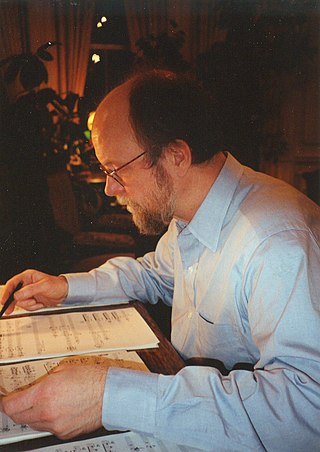
Charles Peter Wuorinen was an American composer of contemporary classical music based in New York City. He also performed as a pianist and conductor. Wuorinen composed more than 270 works: orchestral music, chamber music, solo instrumental and vocal works, and operas, such as Brokeback Mountain. His work was termed serialist but he came to disparage that idea as meaningless. Time's Encomium, his only purely electronic piece, received the Pulitzer Prize. Wuorinen taught at several institutions, including Columbia University and the Manhattan School of Music.

Symphony No. 3 "Kaddish" is a programmatic choral symphony by Leonard Bernstein, published in 1963. It is a dramatic work written for a large orchestra, a full choir, a boys' choir, a soprano soloist and a narrator. "Kaddish" refers to the Jewish prayer that is chanted at every synagogue service for the dead but never mentions "death."

Walter Johannes Damrosch was a Kingdom of Prussia-born American conductor and composer. He was the director of the New York Symphony Orchestra and conducted the world premiere performances of various works, including Aaron Copland's Symphony for Organ and Orchestra, George Gershwin's Piano Concerto in F and An American in Paris, and Jean Sibelius' Tapiola. Damrosch was also instrumental in the founding of Carnegie Hall. He also conducted the first performance of Rachmaninoff's Piano Concerto No. 3 with the composer himself as soloist.

Standing Stone is Paul McCartney's second full-length release of original classical music, although he defined it as orchestral music. It was issued shortly after the release of Flaming Pie. The world premiere performance was held at The Royal Albert Hall on 14 October 1997.
The Apostles, Op. 49, is an oratorio for soloists, chorus and orchestra composed by Edward Elgar. It was first performed on 14 October 1903 at the Birmingham Music Festival.
The Kingdom, Op. 51, is an English-language oratorio composed in 1906 by Edward Elgar. It was first performed at the Birmingham Music Festival on 3 October 1906, with the orchestra conducted by the composer, and soloists Agnes Nicholls, Muriel Foster, John Coates and William Higley. The dedication is "A. M. D. G." Elgar wrote The Kingdom for choral and instrumental forces.

Theodora is a dramatic oratorio in three acts by George Frideric Handel, set to an English libretto by Thomas Morell. The oratorio concerns the Christian martyr Theodora and her Christian-converted Roman lover, Didymus. It had its first performance at Covent Garden Theatre on 16 March 1750. Not popular with audiences in Handel's day, Theodora is now recognised as a masterpiece. It is usually given in concert, being an oratorio, but is sometimes staged.
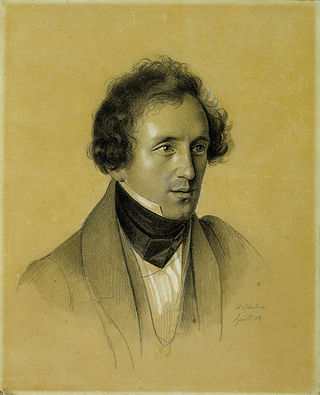
St. Paul, Op. 36, is an oratorio by Felix Mendelssohn. The composer oversaw versions and performances in both German and English within months of completing the music in early 1836.
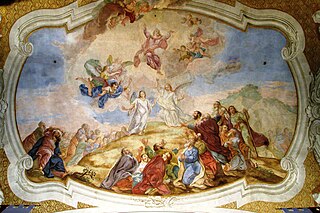
Lobet Gott in seinen Reichen, BWV 11, known as the Ascension Oratorio, is an oratorio by Johann Sebastian Bach, marked by him as Oratorium In Festo Ascensionis Xsti, composed for the service for Ascension and probably first performed on 15 May 1738.

Georgy Vasilyevich Sviridov was a Soviet and Russian neoromantic composer. He is most widely known for his choral music, strongly influenced by the traditional chant of the Russian Orthodox Church, as well as his orchestral works which often celebrate elements of Russian culture.
(Frank) Neely Bruce is an American composer, conductor, pianist, and scholar of American music. He is the composer of over 800 works including three full-length operas. Currently, he is John Spencer Camp Professor of Music and American Studies at Wesleyan University, where he has taught since 1974.

The Prodigal Son is an oratorio by Arthur Sullivan with text taken from the parable of the same name in the Gospel of Luke. It features chorus with soprano, contralto, tenor and bass solos. It premiered in Worcester Cathedral on 10 September 1869 as part of the Three Choirs Festival.

The Light of the World is an oratorio composed in 1873 by Arthur Sullivan. Sullivan wrote the libretto with the assistance of George Grove, based on the New Testament. The work was inspired by William Holman Hunt's popular 1853–54 painting, The Light of the World. The story of the oratorio follows the whole life of Christ, told mostly in the first person, focusing on his deeds on Earth as preacher, healer and prophet.
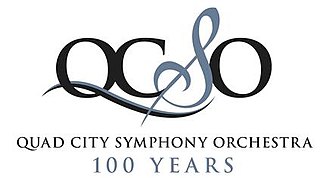
The Quad City Symphony Orchestra (QCSO) is a United States symphony orchestra based in Davenport, Iowa, and representing the Quad Cities area. The current music director and conductor is Mark Russell Smith. Established in 1916, the orchestra has a full season, performing six Masterworks series concerts, three pops concerts, and five signature series chamber concerts. The 96-member orchestra principally performs at two venues: the Adler Theater, located in Davenport, Iowa and Centennial Hall on the campus of Augustana College in Rock Island, Illinois. The Riverfront Pops Concert in early September is held at the W.D. Petersen Memorial Music Pavilion in LeClaire Park on the Davenport riverfront. Its Holiday Pops Concert is performed at the Adler Theater. The signature series concerts are held in a more intimate setting, often at the Figge Art Museum. It also maintains four ensembles for local youth and conducts extensive outreach in area schools.

Merrill Bradshaw was an American composer and professor at Brigham Young University (BYU), where he was composer-in-residence from 1967 to 1994.
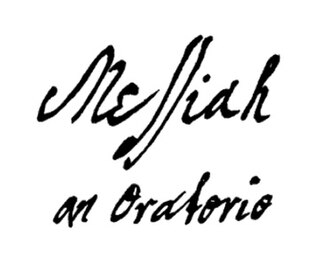
Messiah, the English-language oratorio composed by George Frideric Handel in 1741, is structured in three parts, listed here in tables for their musical setting and biblical sources.

Messiah, the English-language oratorio composed by George Frideric Handel in 1741, is structured in three parts. This listing covers Part II in a table and comments on individual movements, reflecting the relation of the musical setting to the text. Part I begins with the prophecy of the Messiah and his birth, shows the annunciation to the shepherds and reflects the Messiah's deeds on earth. Part II covers the Passion in nine movements including the oratorio's longest movement, an air for alto He was despised, then mentions death, resurrection, ascension, and reflects the spreading of the Gospel and its rejection. The part is concluded by a scene called "God's Triumph" that culminates in the Hallelujah chorus. Part III of the oratorio concentrates on Paul's teaching of the resurrection of the dead and Christ's glorification in heaven.

Messiah, the English-language oratorio composed by George Frideric Handel in 1741, is structured in three parts. This listing covers Part III in a table and comments on individual movements, reflecting the relation of the musical setting to the text. Part I begins with the prophecy of the Messiah and his birth, shows the annunciation to the shepherds as a scene from the Gospel of Luke, and reflects the Messiah's deeds on Earth. Part II covers the Passion, death, resurrection, ascension, and the later spreading of the Gospel. Part III concentrates on Paul's teaching of the resurrection of the dead and Christ's glorification in heaven.
Donald Young Sur was a Korean American composer and musicologist. Although he is best known for his large-scale oratorio, Slavery Documents, most of his works were composed for small chamber ensembles. Sur was born in Honolulu and moved with his family to Los Angeles after World War II. He studied at the University of California and Princeton before spending four years in Korea researching ancient Korean court music. After receiving his doctorate from Harvard in 1972, he settled in Boston, Massachusetts, where many of his works were premiered and where he taught at several local universities, including Harvard, MIT, and Tufts.
References
- Burbank, Richard D., Charles Wuorinen: A Bio-Bibliography. Greenwood Press, 1994. ISBN 0-313-25399-4